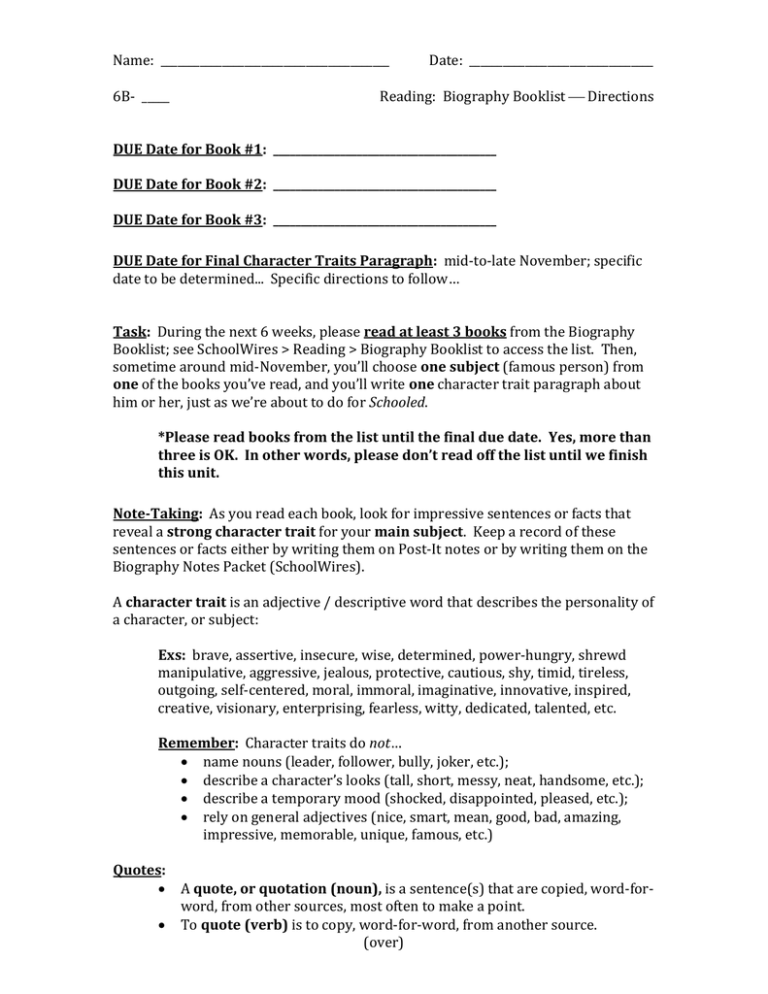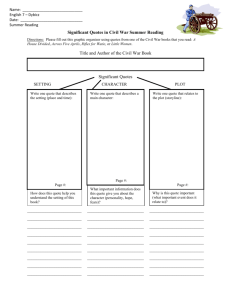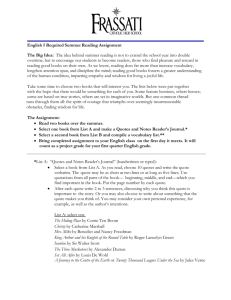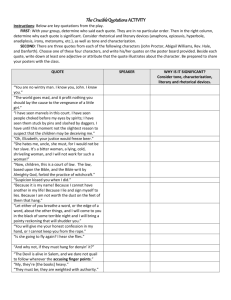Name: Date: 6B- _____ Reading: Biography Booklist ¾ Directions
advertisement

Name: _________________________________________ 6B- _____ Date: _________________________________ Reading: Biography Booklist Directions DUE Date for Book #1: ________________________________________ DUE Date for Book #2: ________________________________________ DUE Date for Book #3: ________________________________________ DUE Date for Final Character Traits Paragraph: mid-to-late November; specific date to be determined... Specific directions to follow… Task: During the next 6 weeks, please read at least 3 books from the Biography Booklist; see SchoolWires > Reading > Biography Booklist to access the list. Then, sometime around mid-November, you’ll choose one subject (famous person) from one of the books you’ve read, and you’ll write one character trait paragraph about him or her, just as we’re about to do for Schooled. *Please read books from the list until the final due date. Yes, more than three is OK. In other words, please don’t read off the list until we finish this unit. Note-Taking: As you read each book, look for impressive sentences or facts that reveal a strong character trait for your main subject. Keep a record of these sentences or facts either by writing them on Post-It notes or by writing them on the Biography Notes Packet (SchoolWires). A character trait is an adjective / descriptive word that describes the personality of a character, or subject: Exs: brave, assertive, insecure, wise, determined, power-hungry, shrewd manipulative, aggressive, jealous, protective, cautious, shy, timid, tireless, outgoing, self-centered, moral, immoral, imaginative, innovative, inspired, creative, visionary, enterprising, fearless, witty, dedicated, talented, etc. Remember: Character traits do not… name nouns (leader, follower, bully, joker, etc.); describe a character’s looks (tall, short, messy, neat, handsome, etc.); describe a temporary mood (shocked, disappointed, pleased, etc.); rely on general adjectives (nice, smart, mean, good, bad, amazing, impressive, memorable, unique, famous, etc.) Quotes: A quote, or quotation (noun), is a sentence(s) that are copied, word-forword, from other sources, most often to make a point. To quote (verb) is to copy, word-for-word, from another source. (over) To find good quotes that reveal a subject’s personality, consider the following: 1. what the subject says, does, thinks, and feels (DAFT) 2. other people’s reactions (others’ DAFT) to your subject 3. the basic facts and physical looks of your subject, though these tend not to be the strongest forms of characterization *See Methods of Characterization notes. Notes: To finish a book, you need to make an average of at least one note per 20 pages. (Ex: 200 pages = at least 10 notes; round upward.) Each note should state three things: 1. the quote, copied word-for-word from the page 2. the character trait(s) that best fit this quote 3. the page number on which you found the quote STUFF THAT GETS BOLDFACED, UNDERLINED, AND CAPITALIZED: YOU MAY USE ELLIPSES (…) IF YOU WISH TO SHORTEN LENGTHY QUOTES, BUT YOU MUST WRITE THE DEFINITIVE, ESSENTIAL, REVEALING PART OF YOUR QUOTE ON YOUR POST-IT SO THAT IT CLEARLY SUPPORTS YOUR TRAIT. LOOK FOR DEEPLY REVEALING QUOTES THAT GET BEYOND FIRST IMPRESSIONS, MOODS, PASSING MOMENTS, UNIMPORTANT EVENTS. LOOK FOR QUOTES THAT SHOW A CHARACTER TRAIT, NOT QUOTES THAT SIMPLY NAME A CHARACTER TRAIT WITHOUT SHOWING IT. STRONG QUOTES OFTEN SOUND POETIC AND ALWAYS CONTAIN DEEP, MEANINGFUL IDEAS THAT ARE WRITTEN IN SPECIAL TERMS THAT ARE WORTH PRESERVING IN THEIR ORIGINAL WORDING. YOU MAY, OF COURSE, QUOTE DIALOGUE (TALKING THAT ALREADY APPEARS IN QUOTATION MARKS). YOU MAY ALSO QUOTE NARRATION (THE AUTHOR’S WRITING THAT DOESN’T APPEAR IN QUOTATION MARKS.) Show me your notes on or before the book deadlines. If you use Post-It notes, save them: After you’ve shown your notes to me, peel them out of the books and store them in a safe place. You’ll need them for the writing assignment. Or, if you wish, you may copy your notes onto the Biography Notes handout. (See SchoolWires > Reading > Character Booklist.)





